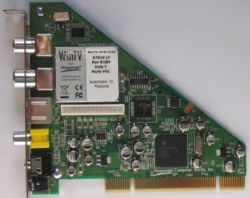Hauppauge WinTV-HVR-1120
The Hauppauge WinTV-HVR-1120 is a hybrid analog and DVB-T PCI card.
It sometimes ships in a HVR-1100 box. The HVR-1120, however, is of triangular shape, while the HVR-1100 board is a typical rectangular shaped card. There are significant component differences too.
Overview/Features
Components Used
- a Philips SAA7131 A/V decoder & bridge
- an NXP TDA10048 digital demodulator
Other Images
Identification
If "lspci -v" shows something like this:
Multimedia controller: Philips Semiconductors SAA7133/SAA7135 Video Broadcast Decoder (rev d1) Subsystem: Hauppauge computer works Inc. Unknown device 6707
with the 6707 at the end, you have a WinTV-HVR-1120.
Installing the HVR-1120
Installing the SAA7134 Driver
The analog tuner of the HVR-1120 runs out of the box. The kernel moduls are already included in the 2.6.20 kernel. No driver installation is required. Look out for something like
kernel: saa7130/34: v4l2 driver version 0.2.14 loaded
in the /var/log/messages to make sure the driver is loaded.
Installing the SAA7134-dvb Modules
The WinTV-HVR-1120 needs kernel 2.6.31 as a minimum. In order for the DVB-T to work an additional module, SAA7134-dvb, and the firmware has to be installed. First of all, check whether the module is already installed. Scan through
dmesg
and look out for something like
DVB: registering new adapter (saa7133[0]). DVB: registering frontend 1 (NXP TDA10048HN DVB-T)...
If you find that, than the SAA7134-dvb kernel module is already installed. Please not that in this case the HVR-1120 is the second DVB card registered in the system. You see that since frontend is 1 and not 0. If kernel module is not installed, load it into the kernel like this
modprobe saa7134-dvb.
This should automatically create a folder in /dev:
/dev/dvb/adapterN
where N is an integer. The first dvb card will be numbered starting at N=0, each following card will increase N by one. Issue an
dmesg
command to check whether the kernel module has been loaded. Output should be
DVB: registering new adapter (saa7133[0]) DVB: registering frontend 1 (NXP TDA10048HN DVB-T)...
Installing the Firmware
This card requires a firmware file (dvb-fe-tda10048.fw) for the demodulator, which can be obtained here: [1]
Once the download is complete, place a copy of the firmware file in your /lib/firmware or /usr/lib/hotplug/firmware directory. (This directory may differ with some distros; consult your distro's documentation for the appropriate location).
Making the Modules Load into the Kernel at Startup
In order that the saa7134-dvb module gets loaded at startup add following line
install saa7134 /sbin/modprobe --ignore-install saa7134 && { /sbin/modprobe saa7134-alsa; } && { /sbin/modprobe saa7134-dvb;}
to the modprobe.conf in
/etc/modprobe.conf
Now check whether everything is working as it should. Restart the PC and check the /var/log/messages. Look out for something like:
kernel: DVB: registering new adapter (saa7133[0]). kernel: DVB: registering frontend 1 (NXP TDA10048HN DVB-T)...
telling you the dvb modules got loaded. Please note that in this case the system has two DVB cards. The second one (frontend 1) is the HVR 1120.
tda10048_firmware_upload: waiting for firmware upload (dvb-fe-tda10048-1.0.fw)... saa7134 0000:00:0e.0: firmware: requesting dvb-fe-tda10048-1.0.fw tda10048_firmware_upload: firmware read 24878 bytes. tda10048_firmware_upload: firmware uploading tda10048_firmware_upload: firmware uploaded
tells you that firmware has also been loaded.
Next Step
The next step is to create a channels.conf. To this end follow the link Testing your DVB device
